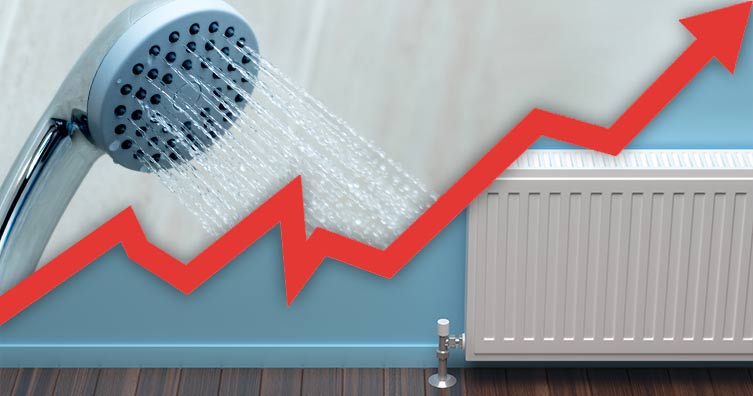How to get help with energy bills
If you're worried about how you'll pay your energy bills this winter, here's all the help with gas and electricity that students can get.

Credit: Before i Go (shower), Eightshot_Studio (graph), rawf8 (radiator) - Shutterstock
There are countless reasons for the current energy crisis that's being felt in the UK and across the world.
We're here to help you understand what's going on, and the help that's out there.
Read on to discover how much you could be paying for energy this year, plus the support funds you can look to for funding.
What's in this guide?
What is the energy price cap?

Credit: Jevanto Productions - Shutterstock
The energy price cap is a legally enforced limit on the price of gas and electricity. It's designed to stop energy suppliers from charging you significantly more for energy than it costs them to source it.
Although it's often advertised as a cap on the overall cost of your bill, the energy price cap is actually a limit on the cost per unit of energy. This means there is no cap on how expensive your bill could be.
So in the height of the crisis when we were hearing of the energy price cap being £2,500 per year, this figure was what the average household's bill would have been during that particular price cap.
If your household size or energy usage exceeds the average, your annual bill could exceed the advertised price cap. And likewise, if you're part of a small household or use very little energy, your annual bill will probably be less than the advertised cap.
Also remember that, even if you somehow managed to use no energy at all, you'd still have to pay the standing charge. This is a daily fee you pay to cover the cost of supplying your property with gas and electricity, and it's also subject to a cap.
What is the energy price cap in 2024?
The energy price cap is currently £0.29 per kWh for electricity (with a maximum standing charge of £0.53 per day) and £0.07 per kWh for gas (with a maximum standing charge of £0.30 per day).
For the average household, this caps the annual bill at £1,928.
The price cap used to change twice a year but it is currently set every three months. This helps reflect the changes in costs as well as inflation. The current price cap came into force on 1st January 2024 and will carry through til 31st March 2024.
It's also worth noting that even the caps on cost per unit and standing charges aren't the same for everyone. The actual figure will vary depending on your region, payment method and meter type – but not drastically.
And if you're thinking "using the heating has always been expensive, what's new?" – here's how the energy price cap has changed over the past few years:
| Date | Energy price cap (average annual bill) | Monthly cost | Change in monthly bill |
|---|---|---|---|
| April 2020 | £1,162 | £97 | - |
| October 2020 | £1,042 | £87 | -£10 |
| April 2021 | £1,138 | £95 | +£8 |
| October 2021 | £1,277 | £106 | +£11 |
| April 2022 | £1,971 | £164 | +£58 |
| October 2022 | £2,500 | £208 | +£44 |
| July 2023 | £1,976 | £165 | -£43 |
| October 2023 | £1,834 | £153 | -£12 |
| January 2024 | £1,928 | £161 | +£8 |
As you can see, before the crisis, the energy price cap was relatively stable. The increases in 2022 almost doubled bills within the space of a year, which is why the government froze the cap and provided extra support.
Should you switch energy suppliers?

Credit: Gokhan Y - Shutterstock
For as long as we can remember, one of our top money-saving tips was to switch energy suppliers. But, during the energy crisis, we had to rethink this.
For a while, almost every single energy company was charging the price cap. In other words, no matter who supplied your gas and electricity, you'd likely be paying the same amount. And if you needed to pay an early-exit fee to leave your current provider, switching could actually have cost you money.
However, things are beginning to change and suppliers are starting to offer fixed-rate energy tariffs.
Fixed-rate tariffs can help with your household budgeting as you will know what unit rate you are paying in advance. However, with energy prices still being pretty unpredictable, you may find yourself in a situation where prices continue to fall, the price cap drops, and you're stuck on a higher tariff with a high-cost exit fee.
With that in mind, it's really important you do your research and choose the deal that is right for you based on your usage. Check out our guide to energy suppliers for more info.
What if your energy provider increases your Direct Debit?
When you pay your energy bills by Direct Debit, they generally charge you a flat amount each month. You might overpay in the summer and underpay in the winter, but the idea is that it levels out across the year. It's quick, easy and you usually get a small discount for paying this way.
But in the weeks and months leading up to the initial price cap announcement, people across the country were contacted by their energy supplier to say their Direct Debit payments were going up. And often it was by several hundred pounds – far more than their actual bills would increase by.
If you find your Direct Debit has increased far above what your actual usage will be, here's what to do:
- Claim the money back – If your energy account is in credit (i.e. you've paid in more than needed), you can reclaim the extra money at any time. This won't change the Direct Debit going forward, but it does at least claw some cash back if they've already taken a huge payment.
- Try to change the Direct Debit online – Head to your online account and see if you can change the payment amount there. This may not work, but it's certainly worth a go.
- Call your supplier – Energy companies must be able to justify how they've calculated your Direct Debit amount. Ask them to supply the meter readings they've used to reach the new amount* and see if they match up with those on your bills. If your account is in credit, use this as proof that they're charging you too much.
- Complain to the energy ombudsman – If your supplier won't change your Direct Debit amount and can't explain why, you can complain to the industry ombudsman. Our guide to making complaints has more info.
* Take this as a reminder to submit monthly meter readings to your energy provider. Unless you have a smart meter, failing to submit readings just means your company has to guess how much energy you're using – and they could be way off.
Financial support from energy suppliers

Credit: Africa Studio - Shutterstock
Some providers – especially the big ones – offer non-repayable support to people struggling to pay their bills.
As with university hardship funds, energy suppliers are pretty strict about who can access this cash. You'll usually need to provide proof of income, complete a budget, and explain how you've ended up in this situation and how the grant will help you. You may also need to have spoken to a debt adviser to be considered eligible.
There will also be more specific eligibility criteria depending on who supplies your energy. Some will only help customers receiving a form of benefits, some will need your account to be in debt by at least a certain amount, and others will stop you from applying if you've already received cash from the fund in the past year or two.
Below, we've summarised what's on offer from some of the biggest suppliers, and how to apply.
Energy company hardship grants 2024
| Energy supplier | Grant available | How to apply |
|---|---|---|
| British Gas (also open to customers of all suppliers)* | Up to £2,000 | Via the British Gas Energy Trust website |
| EDF | Varies by circumstances | Via the EDF Energy website |
| E.on Next | Varies by circumstances | Via the E.ON Next Energy Fund website |
| Octopus Energy | Varies by circumstances | Via the Octopus Energy website |
| Scottish Power | Varies by circumstances | Via the Scottish Power website |
| Utility Warehouse | Varies by circumstances | Call Utility Warehouse on 0333 777 3215 |
* The eligibility criteria will vary slightly depending on whether you're a British Gas customer or not.
Note that this is not a comprehensive list of all energy grants on offer. If you can't see your supplier in the table, it's worth visiting their website or contacting them yourself to see if they offer a similar scheme.
Getting paid to reduce your electricity usage
During the winter of 2022/2023, British Gas, EDF, E.ON Next, Octopus Energy, Ovo and Utilita all began offering plans whereby customers were paid for cutting their use of electricity during peak hours.
The exact workings of each scheme vary between suppliers, but fundamentally the rules are the same. For starters, you'll need to have a smart meter so your supplier can track exactly how much electricity you're using, and when.
Participating customers are asked to reduce their electricity use during peak hours, which tend to be between 4pm – 7pm. The energy supplier then pays you, usually as credit to your account.
How much you earn depends on who you're with and how much you cut your usage by, but it can total as much as £100 over the winter months.
Given how short the peak hour period is, it's definitely worth giving it a go. You can use the time to head to the gym, go for a walk, or even study in the warmth of the library.
The National Grid's Demand Flexibility Service
Many of the companies offering to pay customers to reduce their energy usage did so under a scheme launched by the National Grid (the company in charge of supplying energy in the UK). And the Demand Flexibility Service is due to return again this winter.
We're still waiting for further details of this year's scheme to be announced, but in the meantime you can check details of some of the companies' schemes on the following pages:
Other help with energy bills from your supplier
Even if you're not eligible for a hardship grant from your energy supplier, there are still ways they can help you, including:
- Extra time to pay
- A review of your current payment plan
- Creating a debt repayment plan
- Payment breaks.
To find out all of your options, contact your supplier or head to their website.
Energy crisis FAQs
Will energy prices go down in 2024?
Since June 2023 when the initial £2,500 energy price cap finished, energy prices have gone down. As you can see from the table above, in July 2023 the energy price cap dropped to £1,976 and in October 2023 it dropped further to £1,834.
However, in January 2024, it increased to £1,928.
The price cap is expected to fluctuate over the next year. It's worth bearing in mind that the government has changed its policy on energy bills a number of times, often at just a few weeks' notice.
How can you save money on your energy bills?
Students have always been pretty good at keeping energy bills down. But with the current energy crisis, you may find you need to go to extra lengths to save money on gas and electricity.
One tip that's proving very popular is to buy a heated blanket, which you can often find for around £30.
They'll keep you nice and toasty throughout the winter, but should cost much less to run than the radiators in your house. You can find out more about them, including how to use them safely, in our full guide to getting cheap electric blankets.
That's just one hack though. Check out our guide to saving on energy bills for loads more tips.
Is there any extra energy bill support for students?
In short, no.
Back in February 2022, the government announced extra financial support for UK households in the form of a £400 grant paid into every energy account in the UK. This grant was paid per household, not per person, so whether you lived by yourself or in a house of six people, your energy account received £400.
Despite the fact that many universities and private accommodation providers increased rents for the 2022/23 academic year in anticipation of rising energy costs, government support was not available to students living in halls. However, it was available to those living in privately rented accommodation.
The scheme ended in March 2023 and it doesn't look like there will be any such schemes for the 2023/2024 winter.
Most of the extra funds now available are for those on low incomes and require you to be claiming some kind of benefit or Universal Credit. But students usually aren't eligible for these, so despite being on a low income (often lower than some people who are eligible), they can't receive the financial support the government has issued to tackle the energy crisis.
We'll continue to pressure the government to issue extra funding that's available to all students. But if you're among the minority of students who are eligible for benefits, this page summarises the additional support that's available.
Can universities help with energy bill costs?
During the height of the energy crisis in 2022, the Univerity of York became the first university in the UK to offer household energy grants to off-campus students struggling with their bills.
A few other universities followed suit and some are still available. For example, the University of Greenwich has Energy Bill Financial Support which offers a one-off payment of £200 to those struggling with bills.
Many universities also provide support around campus by offering shower facilities for free and longer opening hours in libraries where students can stay warm and charge up devices.
What happens if your energy company goes bust?
In the past year or so, a number of energy suppliers have gone bust. If this happens, don't panic.
When an energy company goes out of business, its customers are simply moved to another company. You won't need to do anything.
In a very small number of cases, the government may decide that a failing provider is too big and has too many customers to move to a competitor. If so, they'll place the company into what's known as 'special administration'.
This happened to Bulb when it faced financial trouble in late 2021. In October 2022 it was eventually bought by Octopus Energy, with its customers moving to the new supplier. But until then, the company basically ran as usual with no added costs or risks to Bulb's customers.
How much does it cost to use each device in your home?
Whether you're a keen gamer or you drink 20 cups of tea a day, you probably have at least one electronic device that gets you through the day.
Knowing how much each of these costs to run is vital to keeping your bills down this winter. So, to give you an idea of where you can make some savings, we've listed the cost of energy per device under the most recent price cap. You might be shocked at just how expensive it is to run showers...
How should you decide how much energy to use?
Surviving shared living can be tricky at the best of times, and an energy price crisis hardly helps matters. Arguments about leaving lights on or leaving things on standby could have been a lot more intense this year...
We can't resolve every dispute for you, but we can help with a couple of biggies: heating and showering.
The World Health Organisation (WHO) recommends that you keep your home at around 18°C.
Remember that central heating doesn't just serve to keep you warm, either. If your house gets too cold, patches of damp may emerge. Worse still, your landlord could hold you responsible if they conclude that you didn't properly ventilate or heat the property.
It could be an idea to use the timer so the heating only comes on when you and your housemates will be around.
As for showers, experts say you should only be in there for a maximum of 10 minutes – but ideally around half that. Aside from saving water and energy, this should also be better for your skin.
How do you split energy bills?
Our guide to student bills has everything you need to know about setting up utilities and splitting the costs.
But arguably the most important point, especially with energy bills being so expensive, is to make sure nobody is left in the lurch.
If you choose to nominate one flatmate to handle energy bills, it's vital that you transfer the money comfortably before they need to pay. That way, they shouldn't be hitting the limit of their student overdraft just to cover your share of the bill.
Our list of the best money-saving tips has loads of hacks for helping you fight the cost of living crisis.








